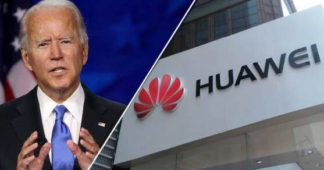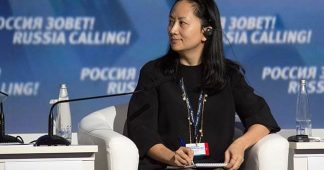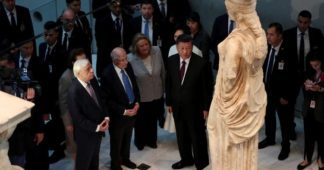Chinese firms should abandon illusion on US as destiny attached to nation
Chen QingqingShen WeiduoLi Xuanmin Zhang Hongpei
Sep 27, 2021
Photo: Xinhua
Over the past two days, Huawei senior executive Meng Wanzhou’s return from Canada has ignited the latest surge of national pride, with the Chinese people welcoming her back home with massive and spontaneous celebrations both online and offline. Many people also took the incident of Meng as a symbolic turning point in the years-long geopolitical wrestling between China and the US, calling her return a hard-fought victory for the country and its people against the Western hegemony.
When some Western media and observers tried to depict such natural outpouring of pride as “well-arranged patriotic propaganda,” such interpretation reflected the West-led ignorance about how the Chinese public understands the incident of Meng, why they are being genuinely proud of her return, and more importantly, what lesson Chinese companies and individuals have learned from this landmark incident amid the US-China confrontation that has been rapidly reshaped the geopolitical landscape across the globe.
When Meng landed at Shenzhen airport on Saturday night, more than 400 million people watched the livestreaming of her arrival, and the entire city – dubbed as China’s Silicon Valley and where Huawei’s headquarters is located – was lit up to welcome her return. Related topics trended on Chinese Twitter-like social media platform Sina Weibo, and some footage showed a 91-year-old veteran giving a sign of thumb-up.
Many businesspeople, factory workers, and intellectuals also shared the moment of Meng’s return on their personal social network accounts, highlighting several points in Meng’s brief remarks at the airport on Saturday. For example, she mentioned that “without a strong motherland, I would not have been freed,” and “the past three years made me realize that the destiny of the enterprise and individual interests are closely linked to the country’s destiny, and the motherland always has our back.”
Proud moment
Such a warm welcome by the Chinese public was spontaneous, reflecting that certain public anger accumulated over the past few years during the US-launched trade war against China has been unleashed and pacified, Zhang Yiwu, a professor at Peking University, told the Global Times on Monday.
“Many Chinese are dissatisfied with the unilateral moves and bullying tactics the US government has adopted, and such anger has reached a peak. It’s also the time when some have come to realize that America is not as strong as they have thought,” he said.
The Chinese public cheered that Meng has not become another victim of “the American trap,” a well-known book in China authored by former Alstom CEO Frederic Pierucci, who was sentenced in the US on foreign bribery charges for five years in prison. It’s a vivid example of how Washington used “long-arm jurisdiction” to strike down competitors, which is also called “the French version of Huawei incident.”
Meng’s return was symbolic as well, as it signaled another proof of a failing America, like its messy withdrawal from Afghanistan, Zhang said, noting that when it comes to issues related to its core interests and fundamental lines, China always has to uphold its bottom line, and Meng’s case has proved this point.
It was also a hard-fought victory in the geopolitical confrontation between China and the US, lifting the spirits and further enhancing the public confidence, experts said.
Chinese diplomats said Meng’s return was a victory of the Chinese people and of justice. A strong China under the leadership of the Communist Party of China is always the firm support of every Chinese citizen, Chinese Foreign Ministry spokesperson Hua Chunying said at a routine press conference on Monday.
“China believes more countries will stand up to all kinds of illegal unilateral sanctions, long-arm jurisdiction, and political framing, jointly uphold international fairness and justice and safeguard the basic norms governing international relations,” State Councilor and Foreign Minister Wang Yi said in a phone call with Venezuela’s Foreign Minister Felix Plasencia on Monday.
As the most important factor for the return of Meng, the constant efforts that the Chinese government has made also showed national strength and determination, which helped shape the outcome, some experts said.
“Without showcasing such national power with a series of deterrence and punishment targeted at the Canadian government, we won’t reach this result,” Shen Yi, a professor at the School of International Relations and Public Affairs of Fudan University, told the Global Times on Sunday night.
Whether the legitimate rights of a citizen and his safety when traveling overseas can be protected always depends on whether his country has the capability of protecting them, he said.
It’s also a victory of China’s US diplomacy, as the release of Meng showed that one mistake of the US administration has been corrected in line with the request of China after the Chinese government put forward two lists to Washington in North China’s Tianjin in July, showing that China’s US policies began taking effect, and the remaining mistakes of the US have to be corrected, according to experts.
Lesson for entrepreneurs
While Meng’s return has been a big morale booster for the Chinese public, with patriotism seen in every corner of the country, it also serves as an important lesson for Chinese companies, especially those which have been sanctioned by the US government out of political motives.
Meng’s case tells other Chinese firms that there will never be a situation where “China loses while Chinese firms or people can win,” a Shenzhen-based tech industry insider told the Global Times on condition of anonymity on Monday.
“It’s a lesson: The gain of Chinese companies and Chinese people is closely linked with the country’s rejuvenation process,” said the person, who works in a leading tech firm.
Although Meng returned safe and sound, the incident has left “some scars” on the minds of Chinese businesses or entrepreneurs aiming to go global, especially to the US market, Bill Huang, founder and CEO of CloudMinds, a Beijing-based cloud robotics and AI start-up, told the Global Times on Monday.
CloudMinds was put on the Entity List by the US Commerce Department in May 2020 together with other Chinese high-tech firms mainly in AI and facial recognition sectors.
Mirroring Meng’s suffering, Huang said his feelings toward the motherland have become much stronger, especially after having studied and worked in the US for over 20 years. His mission or responsibility as a bridge between the two countries has grown bigger.
“In the long run, it will be a big loss for the US instead of Chinese tech firms if the crackdown continues,” Huang said, noting that if the US wants to push ahead its AI technologies, it cannot decouple from the strong manufacturing capabilities and rich implementation scenarios that only China owns.
The only way out for Chinese firms, especially for those being put on the Entity List right now, is to give up their illusion on the US government, step up research and development in key technologies to “fight for the right to speak,” Liu Dingding, a veteran industry analyst, told the Global Times on Monday.
This also further attaches the destiny of an enterprise to the country’s decision-making and national efforts, Liu said, while noting that Meng’s case also shows that China will not let any of its firms fall into the trap of the US
Published at www.globaltimes.cn
We remind our readers that publication of articles on our site does not mean that we agree with what is written. Our policy is to publish anything which we consider of interest, so as to assist our readers in forming their opinions. Sometimes we even publish articles with which we totally disagree, since we believe it is important for our readers to be informed on as wide a spectrum of views as possible.











